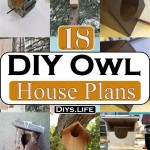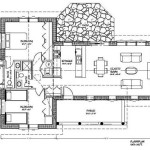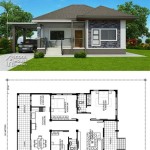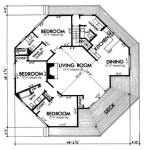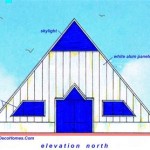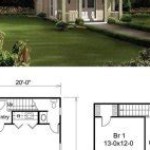House plans with RV garages are specifically designed for homeowners who want to accommodate their recreational vehicles (RVs) under the same roof as their living quarters. These garages are typically larger and taller than standard garages, providing ample space for RVs of varying sizes. For example, a house plan may feature a 12-foot-high RV garage with a 14-foot-wide door, allowing for the convenient storage and maintenance of an RV.
In addition to the primary function of housing an RV, house plans with RV garages often incorporate additional features to enhance functionality and comfort. These features may include separate entrances, workshop areas, and RV hookups, providing homeowners with a dedicated space for RV maintenance and entertainment.
In this article, we will delve into the world of house plans RV garage. We will explore the different types of RV garages, their benefits, and key considerations when choosing and designing a house plan with an RV garage.
When considering house plans with RV garages, there are several key points to keep in mind:
- Size and height
- Separate entrance
- Workshop area
- RV hookups
- Location on the property
- Cost considerations
- Building codes
- Resale value
- HOA regulations
- Personal needs
By carefully considering these factors, homeowners can choose and design a house plan with an RV garage that meets their specific requirements and enhances their lifestyle.
Size and height
The size and height of an RV garage are crucial considerations when choosing a house plan. The dimensions of the garage should accommodate the specific RV that will be stored inside, as well as any additional space required for maintenance and storage.
- Length: The length of the RV garage should be at least the same length as the RV, plus an additional 2-3 feet for maneuvering space.
- Width: The width of the RV garage should be at least 12 feet wide to accommodate most RVs. However, if the RV has slide-outs, additional width may be required.
- Height: The height of the RV garage should be at least 12 feet high to accommodate most RVs. However, if the RV has a roof-mounted air conditioner or other tall features, additional height may be required.
- Door size: The size of the RV garage door should be large enough to accommodate the RV, plus any additional space required for maneuvering. A standard RV garage door is 12 feet high and 14 feet wide, but larger doors may be required for larger RVs.
It is important to note that building codes in some areas may have specific requirements for the size and height of RV garages. Additionally, homeowners should consider the size and height of their RV when choosing a house plan to ensure that the garage will be a suitable fit.
Separate entrance
A separate entrance for the RV garage is a highly desirable feature for many homeowners. This allows RVs to enter and exit the garage without having to go through the main part of the house, which can be especially convenient when the RV is dirty or wet. A separate entrance also helps to keep the main living areas of the house clean and free of RV-related traffic.
There are several different ways to design a separate entrance for an RV garage. One common option is to have a dedicated door and driveway that leads directly to the garage. This type of entrance is ideal for homes that have a large lot and plenty of space for an additional driveway. Another option is to have a shared driveway that leads to both the main house and the RV garage. This type of entrance is more space-efficient, but it may not be as convenient if the RV is frequently used.
In addition to providing convenience, a separate entrance for the RV garage can also enhance security. By keeping the RV garage separate from the main house, homeowners can reduce the risk of theft or vandalism. This is especially important if the RV contains valuable belongings or equipment.
Overall, a separate entrance for the RV garage is a valuable feature that can provide convenience, security, and peace of mind for homeowners.
Workshop area
For many homeowners, the RV garage is more than just a place to store their RV. It is also a dedicated space for hobbies, projects, and repairs. A well-equipped workshop area can make all the difference in the functionality and enjoyment of an RV garage.
- Storage: A workshop area provides ample storage space for tools, equipment, and supplies. This can help to keep the RV garage organized and clutter-free, making it easier to find what you need when you need it.
- Work surfaces: A workshop area should include a variety of work surfaces, such as a workbench, tables, and shelves. This provides a dedicated space for working on projects, repairing the RV, or simply tinkering around.
- Lighting: Good lighting is essential for any workshop area. This can be achieved through a combination of natural light from windows and artificial light from overhead fixtures and work lights.
- Electrical outlets: A sufficient number of electrical outlets is essential for powering tools and equipment. These outlets should be placed in convenient locations throughout the workshop area.
By incorporating a well-equipped workshop area into their RV garage, homeowners can create a dedicated space for their hobbies, projects, and repairs. This can enhance the functionality and enjoyment of the RV garage, making it a valuable asset to the home.
RV hookups
RV hookups are essential for providing power, water, and sewer connections to an RV when it is parked in the garage. These hookups allow homeowners to use their RV’s appliances and systems without having to rely on external sources.
There are three main types of RV hookups:
- Electrical hookups: Electrical hookups provide power to the RV’s electrical system. These hookups are typically rated for 30 or 50 amps, and they require a dedicated electrical outlet and circuit breaker.
- Water hookups: Water hookups provide access to a source of clean water for the RV’s water system. These hookups typically use a standard garden hose connection, and they require a dedicated water supply and shut-off valve.
- Sewer hookups: Sewer hookups provide a way to dispose of wastewater from the RV’s plumbing system. These hookups typically use a standard RV sewer hose connection, and they require a dedicated sewer drain and cleanout.
In addition to these three main types of hookups, some RV garages may also include additional hookups, such as:
- Propane hookups: Propane hookups provide access to a source of propane gas for the RV’s appliances and systems. These hookups typically use a standard RV propane hose connection, and they require a dedicated propane tank and regulator.
- Cable TV hookups: Cable TV hookups provide access to cable television services for the RV’s entertainment system. These hookups typically use a standard coaxial cable connection, and they require a dedicated cable TV outlet and subscription.
- Telephone hookups: Telephone hookups provide access to telephone services for the RV’s communication system. These hookups typically use a standard telephone jack and wiring, and they require a dedicated telephone line and subscription.
By including RV hookups in their garage, homeowners can make it more convenient and enjoyable to use their RV. These hookups allow homeowners to enjoy the comforts of home while they are on the road, and they can also help to extend the life of the RV’s appliances and systems.
Location on the property
The location of the RV garage on the property is an important consideration when choosing a house plan. There are several factors to keep in mind, such as:
- Accessibility: The RV garage should be easily accessible from both the street and the main house. This will make it convenient to get the RV in and out of the garage, and it will also make it easy to access the RV for maintenance and repairs.
- Visibility: The RV garage should be visible from the main house. This will help to deter theft and vandalism, and it will also make it easier to keep an eye on the RV when it is parked in the garage.
- Drainage: The RV garage should be located on a well-drained area of the property. This will help to prevent water from pooling around the garage, which can damage the foundation and lead to flooding.
- Landscaping: The RV garage should be located in a way that minimizes the impact on the surrounding landscaping. This may involve choosing a location that is already cleared of trees and other vegetation, or it may involve designing the garage in a way that complements the existing landscaping.
By carefully considering the location of the RV garage on the property, homeowners can choose a location that meets their specific needs and enhances the overall appearance of their home.
Cost considerations
The cost of building a house with an RV garage can vary significantly depending on a number of factors, including the size and complexity of the garage, the materials used, and the local labor rates. However, there are some general cost considerations that all homeowners should keep in mind when budgeting for a house plan with an RV garage.
One of the biggest factors that will affect the cost of an RV garage is its size. A larger garage will require more materials and labor to build, and it will also require a larger foundation and roof. The complexity of the garage will also affect the cost. A garage with a simple design will be less expensive to build than a garage with a more complex design, such as one with multiple doors or a workshop area.
The materials used to build the garage will also affect the cost. Wood is the most common material used for RV garages, but it is also the most expensive. Steel and concrete are less expensive than wood, but they are also more durable. The type of roofing material used will also affect the cost. Asphalt shingles are the most common and least expensive type of roofing material, but they are also the least durable. Metal roofing is more expensive than asphalt shingles, but it is also more durable and can last longer.
The local labor rates will also affect the cost of building an RV garage. Labor rates vary from one area to another, so it is important to get quotes from several different contractors before making a decision. It is also important to factor in the cost of permits and inspections. These costs can vary depending on the local building codes.
By carefully considering all of these factors, homeowners can get a better idea of the cost of building a house plan with an RV garage. It is important to remember that the cost of building an RV garage is just one factor to consider when choosing a house plan. Homeowners should also consider the benefits of having an RV garage, such as the convenience of storing their RV at home and the increased value that an RV garage can add to their property.
Building codes
Building codes are regulations that govern the construction of buildings. These codes are in place to ensure that buildings are safe and habitable. Building codes vary from one jurisdiction to another, but they typically cover a wide range of topics, including structural requirements, fire safety, and energy efficiency.
When it comes to RV garages, there are a few specific building codes that homeowners should be aware of. These codes typically address the following:
- Size: The size of an RV garage is typically regulated by building codes. The minimum size for an RV garage will vary depending on the jurisdiction, but it is typically around 12 feet wide and 14 feet high. This size is large enough to accommodate most RVs.
- Location: The location of an RV garage on the property is also typically regulated by building codes. The garage must be located in a way that does not obstruct access to the main house or other buildings on the property. It must also be located in a well-drained area to prevent flooding.
- Fire safety: RV garages must meet certain fire safety requirements. These requirements typically include the installation of smoke detectors and fire extinguishers. The garage must also be constructed with fire-resistant materials.
- Energy efficiency: Building codes may also include energy efficiency requirements for RV garages. These requirements typically focus on the insulation of the garage and the efficiency of the garage door.
It is important to note that building codes can vary from one jurisdiction to another. Homeowners should always check with their local building department to determine the specific building codes that apply to their RV garage.
By following building codes, homeowners can ensure that their RV garage is safe and habitable. Building codes also help to protect homeowners from liability in the event of an accident.
Resale value
The resale value of a house with an RV garage can be higher than the resale value of a similar house without an RV garage. This is because RV garages are in high demand by buyers, especially in areas where RVing is popular. An RV garage can add value to a home in several ways:
- Convenience: An RV garage provides a convenient place to store an RV, which can be a major selling point for buyers. RVs are large and can be difficult to park and maneuver, so having a dedicated space to store the RV can be a major convenience for buyers.
- Protection: An RV garage can protect an RV from the elements and from theft. This can help to extend the life of the RV and save buyers money on repairs and replacements.
- Increased living space: An RV garage can be used as additional living space, which can be especially appealing to buyers with large families or who like to entertain. RV garages can be used as a game room, a workshop, or even a home office.
Overall, an RV garage can be a valuable addition to a home, and it can add to the resale value of the home. When considering the resale value of a house with an RV garage, it is important to consider the following factors:
- Location: The location of the RV garage on the property can affect the resale value of the home. A garage that is located in a desirable area, such as a cul-de-sac or on a large lot, will be more valuable than a garage that is located in a less desirable area.
- Size: The size of the RV garage can also affect the resale value of the home. A larger garage will be more valuable than a smaller garage, especially in areas where RVing is popular.
- Amenities: The amenities that are included in the RV garage can also affect the resale value of the home. A garage that includes amenities such as a workshop area, a sink, and a refrigerator will be more valuable than a garage that does not include these amenities.
By carefully considering all of these factors, homeowners can choose a house plan with an RV garage that will meet their needs and add to the resale value of their home.
HOA regulations
Homeowners associations (HOAs) are common in many residential communities. HOAs are responsible for enforcing the community’s rules and regulations, which can include restrictions on the size, location, and appearance of RV garages.
- Size restrictions: HOAs may impose size restrictions on RV garages. These restrictions may limit the length, width, and height of the garage. This is to ensure that RV garages are not too large for the community and that they do not obstruct the view of other homes.
- Location restrictions: HOAs may also impose location restrictions on RV garages. These restrictions may prohibit RV garages from being built in certain areas of the community, such as the front yard or near the street. This is to ensure that RV garages are not located in areas where they will be unsightly or cause traffic congestion.
- Appearance restrictions: HOAs may also impose appearance restrictions on RV garages. These restrictions may specify the materials that can be used to build the garage, the color of the garage, and the type of roof that can be installed. This is to ensure that RV garages are aesthetically pleasing and that they conform to the overall architectural style of the community.
- Other restrictions: In addition to these common restrictions, HOAs may also impose other restrictions on RV garages. These restrictions may vary from one community to another, so it is important to check with the HOA before building an RV garage. Some HOAs may, for example, restrict the use of RV garages for commercial purposes or limit the number of RVs that can be stored in the garage.
It is important to note that HOA regulations can change over time. Homeowners should always check with the HOA before building an RV garage to ensure that they are in compliance with the latest regulations.
Personal needs
When choosing a house plan with an RV garage, it is important to consider your personal needs. This includes the size of your RV, the frequency with which you use it, and the amenities that you want in your garage. If you have a large RV, you will need a garage that is large enough to accommodate it. If you use your RV frequently, you may want a garage that is located close to the main house. And if you want to use your garage for more than just storing your RV, you may want to consider a garage that includes amenities such as a workshop area, a sink, and a refrigerator.
In addition to the size, location, and amenities of the garage, you should also consider your personal needs when choosing a house plan with an RV garage. For example, if you have a family, you may want to choose a garage that is large enough to accommodate your RV and your family’s vehicles. Or, if you are a hobbyist, you may want to choose a garage that includes a workshop area. By considering your personal needs, you can choose a house plan with an RV garage that meets your specific requirements.
Here are some specific questions to consider when assessing your personal needs:
- What size is your RV?
- How often do you use your RV?
- What amenities do you want in your garage?
- Do you have a family?
- Are you a hobbyist?
By answering these questions, you can get a better idea of the type of RV garage that is right for you. Once you have a good understanding of your personal needs, you can start shopping for a house plan with an RV garage that meets your specific requirements.
Choosing a house plan with an RV garage is a big decision. By taking the time to consider your personal needs, you can choose a garage that meets your specific requirements and enhances your lifestyle.










Related Posts

